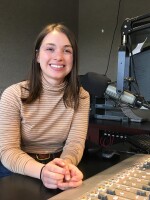Park City community members who participated in a think tank for Park City’s 2020 visioning process came to an agreement in July on what they think they want Park City’s future to look like. Two members of the think tank share how they interpret that future.
The Vision 2020 think tank group called their preferred future for Park City “Embracing Bold Change.”
Hans Fuegi, who has lived in Park City for nearly 40 years, says he’s more on the conservative side of that charge. To him, that means not overlooking what Park City excels in—tourism—but instead looking to expand and include other endeavors in the town’s success.
“Very few of us would be here if it wasn't for this tourism industry, who pays for a lot of the services that are being offered," Fuegi said. "We can't disregard that. Does that mean we can only focus on that? No—to me, it's refining what we're doing, doing it better and start looking at the periphery.”
On the radical side of bold change is Angela Moschetta, founder of the Facebook page Future Park City. She views tourism as something that has brought great amenities to Park City, but it’s also exacerbated issues in the community. Moschetta says the last visioning process produced a direction to “Keep Park City Park City.” She thinks that was misguided.
“What we've gotten is reactionary code—we've been steamrolled by development, people are looking for accolades because they're meeting their affordable housing requirements, when really all we're doing is bringing more bodies and kind of exacerbating that housing crisis," Moschetta said. "So I don't necessarily think that tourism is going away or needs to go away, I just think that we need to become less reliant on it.”
Moschetta says she wants Park City to write its own story. With the impact nightly rentals, empty second homes and traffic congestion have on the community, Moschetta says it’s time to get serious.
“We need progressive and proactive code; we need to take the lead in these development conversations," Moschetta said. "I think the fact that we had major companies come to town, two ski resorts combined into one, and what did we get out of it except for more traffic, increased housing crisis, an increased employment crisis. I think there are things that we can do, they're just tough conversations.”
Fuegi says in the past, Park City struggled, too, though that doesn’t diminish today’s problems. Fuegi says it’s good to have conversations about the future, but what needs to happen is action.
“How do we move forward, both the government and the populace, quite frankly," Fuegi said. "We can sit here, and we can spend money on consultants all day long, but if there's no action coming out of it, that's the hard part now. What's coming now is where people need to engage.”
Park City’s Vision 2020 process started in June, and a final report from data collected through surveys, community workshops and the think tank will be presented at the beginning of next year. The Park City Council is considering testing possible solutions on the community as part of the process, making suggestions and seeing how the public responds.



